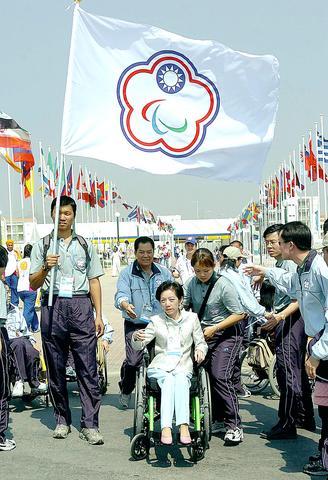First lady Wu Shu-jen (吳淑珍) was scheduled to attend the opening ceremony of the 2004 Athens Paralympic Games last night in her capacity as head of the Taiwanese delegation, using her National Paralympic Card (NPC) card.
Due to concern about Wu's health, the first lady and delegation members were to decide whether she would lead the team in the parade around the arena during the opening ceremony or simply take a seat in the VIP zone.

PHOTO: SUNG CHIH-HSIUNG, TAIPEI TIMES
The controversy over Wu's status was resolved ahead of last night's ceremony, after both Team Taiwan and the International Paralympic Committee (IPC) reached a consensus on Thursday.
The IPC agreed that Wu would retain her NPC card and her status as head of Taiwan's delegation. Both sides agreed that there would be no further talk about the issue.
The hoopla surrounding Wu's status erupted when the IPC, supposedly due to pressure from Beijing, announced on Tuesday that it had replaced Wu as head of the delegation with Linda Chen (
After a protest lodged by the delegation, the IPC's chief executive officer Xavier Gonzalez met with Taiwan team representatives Thursday morning and reached an understanding that Wu could attend all relevant activities in her capacity as head of the team -- a solution that saved face for everyone.
Delegation spokesman James Huang (黃志芳), deputy secretary-general of the Presidential Office, said the consensus was good for both sides as it would allow attention to focus on the athletes.
In an interview with the Associated Press on Thursday, Wu said that Taiwan will participate in the 2008 Beijing Olympics as any ban would only embarrass China: "I can't think of any proper reason to restrict our participation."
"If China applies any kind of political pressure to obstruct our participation, I think their actions will be looked down upon by all of us and will be condemned strongly by the international sports community," she said.
Wu added that she hopes her visit in Greece will increase understanding abroad about the situation in Taiwan as well as raise awareness to help those in involved in sports for mentally- and physically-challenged people.

MAKING WAVES: China’s maritime militia could become a nontraditional threat in war, clogging up shipping lanes to prevent US or Japanese intervention, a report said About 1,900 Chinese ships flying flags of convenience and fishing vessels that participated in China’s military exercises around Taiwan last month and in January have been listed for monitoring, Coast Guard Administration (CGA) Deputy Director-General Hsieh Ching-chin (謝慶欽) said yesterday. Following amendments to the Commercial Port Act (商港法) and the Law of Ships (船舶法) last month, the CGA can designate possible berthing areas or deny ports of call for vessels suspected of loitering around areas where undersea cables can be accessed, Oceans Affairs Council Minister Kuan Bi-ling (管碧玲) said. The list of suspected ships, originally 300, had risen to about 1,900 as

Right-wing political scientist Laura Fernandez on Sunday won Costa Rica’s presidential election by a landslide, after promising to crack down on rising violence linked to the cocaine trade. Fernandez’s nearest rival, economist Alvaro Ramos, conceded defeat as results showed the ruling party far exceeding the threshold of 40 percent needed to avoid a runoff. With 94 percent of polling stations counted, the political heir of outgoing Costa Rican President Rodrigo Chaves had captured 48.3 percent of the vote compared with Ramos’ 33.4 percent, the Supreme Electoral Tribunal said. As soon as the first results were announced, members of Fernandez’s Sovereign People’s Party

MORE RESPONSIBILITY: Draftees would be expected to fight alongside professional soldiers, likely requiring the transformation of some training brigades into combat units The armed forces are to start incorporating new conscripts into combined arms brigades this year to enhance combat readiness, the Executive Yuan’s latest policy report said. The new policy would affect Taiwanese men entering the military for their compulsory service, which was extended to one year under reforms by then-president Tsai Ing-wen (蔡英文) in 2022. The conscripts would be trained to operate machine guns, uncrewed aerial vehicles, anti-tank guided missile launchers and Stinger air defense systems, the report said, adding that the basic training would be lengthened to eight weeks. After basic training, conscripts would be sorted into infantry battalions that would take

GROWING AMBITIONS: The scale and tempo of the operations show that the Strait has become the core theater for China to expand its security interests, the report said Chinese military aircraft incursions around Taiwan have surged nearly 15-fold over the past five years, according to a report released yesterday by the Democratic Progressive Party’s (DPP) Department of China Affairs. Sorties in the Taiwan Strait were previously irregular, totaling 380 in 2020, but have since evolved into routine operations, the report showed. “This demonstrates that the Taiwan Strait has become both the starting point and testing ground for Beijing’s expansionist ambitions,” it said. Driven by military expansionism, China is systematically pursuing actions aimed at altering the regional “status quo,” the department said, adding that Taiwan represents the most critical link in China’s